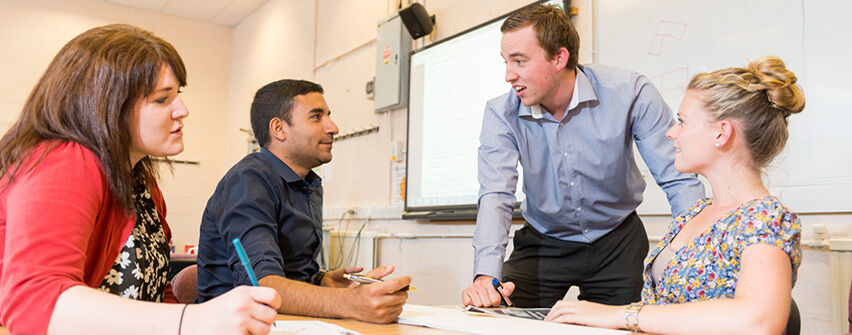This blog describes an introductory workshop for the international partners of the Digi-Doc project which was based on Ursula Le Guin’s ‘Carrier Bag Theory of Fiction’ (2019). In the session, participants shared stories about their experiences of doing a doctorate using symbolic objects of their choice as prompts. The exercise gave the group an opportunity to begin to get to know each other and to appreciate the complexity and challenges that completing a doctorate whilst working and balancing other personal and family responsibilities entails.
Jane O'Connor
Reader in Childhood Studies

Chun Cao, Tan Huynh, Lieu Le, Hanh Luu, Louise Wheatcroft, Antuni Wiyarsi
One of the most important aims for us as a group as we began the Digi-Doc project was to try and understand what the experience of studying for a doctorate whilst also working was like for students in the four participating countries of UK, Vietnam, China and Indonesia. Another key aim of the early stage of the project was for us, the project participants, to get to know each other through sharing and comparing our own personal experiences and by exploring the cultural, institutional and social contexts within which we work and study.
In order to achieve these related aims a workshop was designed based on Ursula Le Guin’s ‘Carrier Bag Theory of Fiction’ (2019).
Le Guin argues that the most important and illuminating stories are often found in the metaphorical carrier bags of experience filled with memories of the past that we all carry with us. Her ‘carrier bag theory’ encourages us to rummage in these bags to find the ‘untold’ stories. These are the stories that aren’t always about winning and making linear progress towards goals, but that are about the objects, ideas and experiences that we gather along the way and that can tell a different story about being human, about struggling, learning, nurturing and helping one another.
In this sense Le Guin reimagines stories as bags for collecting, carrying and telling the ‘stuff’ of living: ‘A leaf a gourd a shell a net a bag a sling a sack a bottle a pot a box a container. A holder. A recipient’ (2019: 32).
Using these ideas we asked the Digi-Doc participants to choose three items which related to their experience of doing a PhD, to put them in a bag and bring them to our online workshop. The items could be anything at all that reminded them of the time in their life when they were studying towards their doctorate. These were then shared with the group, one at a time, along with the stories associated with each object. These stories were fascinating, varied and illuminating and provided precious insights into each others’ experiences and cultures that helped foster a shared understanding and cohesion amongst the group.
Below we share short descriptions of some of the objects that were shared in the ‘carrier bag’ workshop along with an explanation of their significance by the workshop participants:
Chun Cao, Northeast Normal University, China
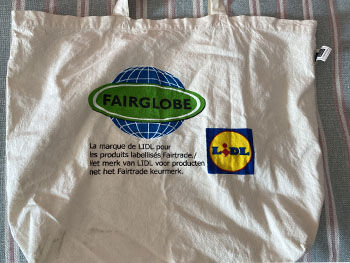
I am Chun Cao, a Chinese researcher having completed the doctoral education in Belgium. In my views, study abroad is not just about pursuit of academic achievement, but also involves living independently in a culturally and linguistically different country. For me, this bag is one of my close companions in Belgium which I carried always to and from the supermarket. It recorded an important part of my lives during those challenging yet enrich years of doctoral tra 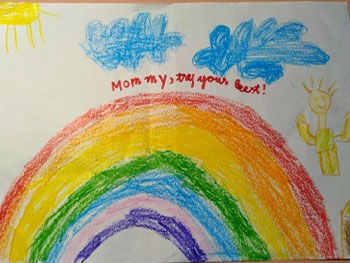 ining, so I took it back to China to keep the memories as fresh as before.
ining, so I took it back to China to keep the memories as fresh as before.
Lieu Le, Ho Chi Minh City University of Education, Vietnam
Doing my doctorate has been the most challenging time in my life. Although I enroll in my PhD program as a full-time student, I still have to work as a lecturer in a university. Therefore, it has been very hard to balance my studying and my work. Whenever I feel stressed and want to give up my study, I always look at a painting drawn by my son. The painting shows an image of a rainbow and myself, and his message to me is, “Mommy, try your best”. This object really touched me and reminded me that I could do it and keep me going with my doctoral program.
Antuni Wiyarsi, Universitas Negeri Yogyakarta, Indonesia
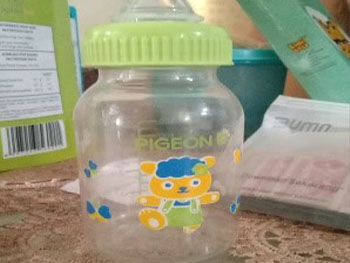
My fourth daughter was born at the end of first semester of my doctoral studies. Since it, I have relied on this item (baby milk bottle) for my baby while I was away on campus. I also brought this item to campus to accommodate expressed breast milk. Why must I bother? Because for me, exclusive breastfeeding is very important for my baby (6 months) and continued breastfeeding until she is two years old. My studies must not sacrifice the interests of my children/family. So, to this day when I see this thing, I always remember my struggle to pursue doctoral degree by raising 2 toddlers as single parents because my husband and my two big children still live in our hometown. Keep spirit for all doctoral students that having toddler.
Tan Huynh, Nguyen Tat Thanh University, Vietnam
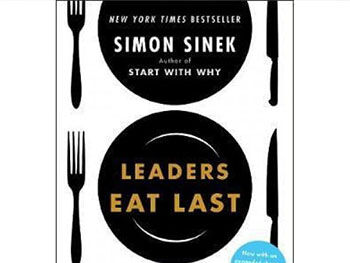
In my PhD student life, reading books and papers has always been my all-time favourite activity, and finding a worth-reading research is like discovering a hidden gemstone. Among all the materials I have read, “Leaders Eat Last” is the one which has the most special meaning to my life. The book has talked about great leaders create environments in which people naturally work together to do remarkable things. Moreover, there are chapters which educate us about how we should treat people around us. Every single word is carefully chosen and concise, all of which are arranged in a poetic way so as for people to memories and understand.
Hanh Luu, Nguyen Tat Thanh University, Vietnam
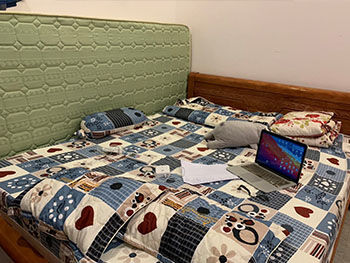
One of the image that i always think of during my PhD journey is my bed. It is not that I am lazy but my bed had become my working station because at that time I was on maternity break. My first daughter was just over a month old when I started writing my thesis. In Asian country, the woman will have at least one month or more confinement after delivering their child depending on the living condition. Therefore, most of the time, I had to stay on my bed. Everytime I was done with my baby routine (pumping, feeding, putting her to sleep), I would take out my thesis things (papers, journals, notes, laptop) and work on bed until my next routine round come. Now that it seems to be a bit much when I recall the memory but I think it would be an unforgettable one when my children grow up.
Louise Wheatcroft, Birmingham City University, England
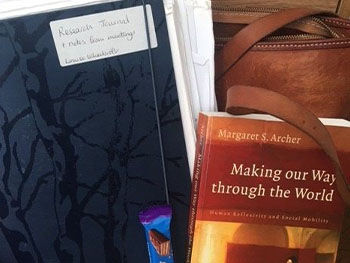
Here is the bag that I carried to and from my supervision meetings. Inside I always carried my notepad that documented my journey through my doctorate with notes from each meeting, reflections and ideas and plans for chapters. It became very heavy over time as the notepad filled up with bits of paper, articles, draft chapters and charts. I usually carried a book by Margaret Archer that was a catalyst for my thinking and a snack to keep me going!
Given its supportive and social value, we are aiming to replicate this workshop with the new intake of doctoral students as they begin their programmes of study in each country in the next academic year.
Reference
Le Guin (2019) The Carrier Bag Theory of Fiction (Introduced by Donna Haraway). Ignota.
